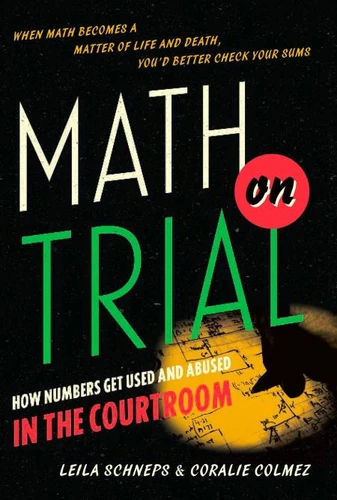Math on Trial. How Numbers Get Used and Abused in the Courtroom
Par : ,Formats :
Disponible dans votre compte client Decitre ou Furet du Nord dès validation de votre commande. Le format ePub protégé est :
- Compatible avec une lecture sur My Vivlio (smartphone, tablette, ordinateur)
- Compatible avec une lecture sur liseuses Vivlio
- Pour les liseuses autres que Vivlio, vous devez utiliser le logiciel Adobe Digital Edition. Non compatible avec la lecture sur les liseuses Kindle, Remarkable et Sony
- Non compatible avec un achat hors France métropolitaine
 , qui est-ce ?
, qui est-ce ?Notre partenaire de plateforme de lecture numérique où vous retrouverez l'ensemble de vos ebooks gratuitement
Pour en savoir plus sur nos ebooks, consultez notre aide en ligne ici
- Nombre de pages272
- FormatePub
- ISBN978-0-465-03794-0
- EAN9780465037940
- Date de parution11/03/2013
- Protection num.Adobe DRM
- Infos supplémentairesepub
- ÉditeurBasic Books
Résumé
In the wrong hands, math can be deadly. Even the simplest numbers can become powerful forces when manipulated by politicians or the media, but in the case of the law, your liberty -- and your life -- can depend on the right calculation. In Math on Trial, mathematicians Leila Schneps and Coralie Colmez describe ten trials spanning from the nineteenth century to today, in which mathematical arguments were used -- and disastrously misused -- as evidence.
They tell the stories of Sally Clark, who was accused of murdering her children by a doctor with a faulty sense of calculation; of nineteenth-century tycoon Hetty Green, whose dispute over her aunt's will became a signal case in the forensic use of mathematics; and of the case of Amanda Knox, in which a judge's misunderstanding of probability led him to discount critical evidence -- which might have kept her in jail.
Offering a fresh angle on cases from the nineteenth-century Dreyfus affair to the murder trial of Dutch nurse Lucia de Berk, Schneps and Colmez show how the improper application of mathematical concepts can mean the difference between walking free and life in prison. A colorful narrative of mathematical abuse, Math on Trial blends courtroom drama, history, and math to show that legal expertise isn't't always enough to prove a person innocent.
They tell the stories of Sally Clark, who was accused of murdering her children by a doctor with a faulty sense of calculation; of nineteenth-century tycoon Hetty Green, whose dispute over her aunt's will became a signal case in the forensic use of mathematics; and of the case of Amanda Knox, in which a judge's misunderstanding of probability led him to discount critical evidence -- which might have kept her in jail.
Offering a fresh angle on cases from the nineteenth-century Dreyfus affair to the murder trial of Dutch nurse Lucia de Berk, Schneps and Colmez show how the improper application of mathematical concepts can mean the difference between walking free and life in prison. A colorful narrative of mathematical abuse, Math on Trial blends courtroom drama, history, and math to show that legal expertise isn't't always enough to prove a person innocent.
In the wrong hands, math can be deadly. Even the simplest numbers can become powerful forces when manipulated by politicians or the media, but in the case of the law, your liberty -- and your life -- can depend on the right calculation. In Math on Trial, mathematicians Leila Schneps and Coralie Colmez describe ten trials spanning from the nineteenth century to today, in which mathematical arguments were used -- and disastrously misused -- as evidence.
They tell the stories of Sally Clark, who was accused of murdering her children by a doctor with a faulty sense of calculation; of nineteenth-century tycoon Hetty Green, whose dispute over her aunt's will became a signal case in the forensic use of mathematics; and of the case of Amanda Knox, in which a judge's misunderstanding of probability led him to discount critical evidence -- which might have kept her in jail.
Offering a fresh angle on cases from the nineteenth-century Dreyfus affair to the murder trial of Dutch nurse Lucia de Berk, Schneps and Colmez show how the improper application of mathematical concepts can mean the difference between walking free and life in prison. A colorful narrative of mathematical abuse, Math on Trial blends courtroom drama, history, and math to show that legal expertise isn't't always enough to prove a person innocent.
They tell the stories of Sally Clark, who was accused of murdering her children by a doctor with a faulty sense of calculation; of nineteenth-century tycoon Hetty Green, whose dispute over her aunt's will became a signal case in the forensic use of mathematics; and of the case of Amanda Knox, in which a judge's misunderstanding of probability led him to discount critical evidence -- which might have kept her in jail.
Offering a fresh angle on cases from the nineteenth-century Dreyfus affair to the murder trial of Dutch nurse Lucia de Berk, Schneps and Colmez show how the improper application of mathematical concepts can mean the difference between walking free and life in prison. A colorful narrative of mathematical abuse, Math on Trial blends courtroom drama, history, and math to show that legal expertise isn't't always enough to prove a person innocent.













